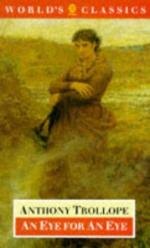CHAPTER III.
Sophie Mellerby.
Lady Scroope thought a great deal about her friend’s communication, but at last made up her mind that she could do nothing till Fred should have returned. Indeed she hardly knew what she could do when he did come back. The more she considered it the greater seemed to her to be the difficulty of doing anything. How is a woman, how is even a mother, to caution a young man against the danger of becoming acquainted with a pretty girl? She could not mention Miss O’Hara’s name without mentioning that of Lady Mary Quin in connexion with it. And when asked, as of course she would be asked, as to her own information, what could she say? She had been told that he had made himself acquainted with a widow lady who had a pretty daughter, and that was all! When young men will run into such difficulties, it is, alas, so very difficult to interfere with them!
And yet the matter was of such importance as to justify almost any interference. A Roman Catholic Irish girl of whom nothing was known but that her mother was said to be a widow, was, in Lady Scroope’s eyes, as formidable a danger as could come in the way of her husband’s heir. Fred Neville was, she thought, with all his good qualities, exactly the man to fall in love with a wild Irish girl. If Fred were to write home some day and say that he was about to marry such a bride,—or, worse again, that he had married her, the tidings would nearly kill the Earl. After all that had been endured, such a termination to the hopes of the family would be too cruel! And Lady Scroope could not but feel the injustice of it. Every thing was being done for this heir, for whom nothing need have been done. He was treated as a son, but he was not a son. He was treated with exceptional favour as a son. Everything was at his disposal. He might marry and begin life at once with every want amply supplied, if he would only marry such a woman as was fit to be a future Countess of Scroope. Very little was required from him. He was not expected to marry an heiress. An heiress indeed was prepared for him, and would be there, ready for him at Christmas,—an heiress, beautiful, well-born, fit in every respect,—religious too. But he was not to be asked to marry Sophie Mellerby. He might choose for himself. There were other well-born young women about the world,—duchesses’ granddaughters in abundance! But it was imperative that he should marry at least a lady, and at least a Protestant.
Lady Scroope felt very strongly that he should never have been allowed to rejoin his regiment, when a home at Scroope was offered to him. He was a free agent of course, and equally of course the title and the property must ultimately be his. But something of a bargain might have been made with him when all the privileges of a son were offered to him. When he was told that he might have all Scroope to




